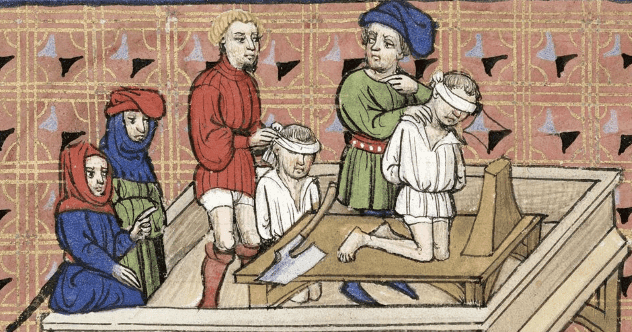Step back in time to the Middle Ages, a fascinating era stretching from about AD 500 to AD 1500. Life then was a world away from ours, marked by kings, knights, and a powerful Church, all part of what’s known as the feudal system. But it wasn’t all castles and chivalry; it was also an age of truly peculiar laws!
Forget modern-day rules – the Middle Ages had some regulations that sound utterly unbelievable today. Get ready to explore ten of the most bizarre laws from medieval times. Thankfully, these peculiar rules are now just a quirky part of history!
10. Playing Football Was Forbidden
Believe it or not, football wasn’t always the beloved sport it is today. Back in medieval times, it was a rough-and-tumble game, far more violent than what we see now. Imagine entire villages kicking an inflated pig’s bladder, with goals sometimes miles apart! Players could kick and punch not just the “ball” but also each other, leading to serious injuries and sometimes even death.
So, why ban it? In 1349, King Edward III outlawed football. His concern wasn’t player safety, but national security! England was at war with France and also battling the Black Death, which had wiped out many. The king needed his healthy men practicing archery, not getting sidetracked (or injured) by football. The penalty for breaking this law? Six days in jail!
9. Blowing One’s Nose Was Illegal
In Newmarket, England, a town famous for horse racing since the 12th century, a rather unusual law was put in place. To protect the valuable racehorses from getting sick, it became illegal for people to blow their noses in the street! Imagine having hay fever back then – it must have been quite a challenge.
And that wasn’t all. If you were caught walking around with a head cold or a fever, you could face a fine. Clearly, horse racing was serious business, and keeping the horses healthy was a top priority.
8. You Had to Have Your Master’s Permission to Get Married
Today, asking for a partner’s hand in marriage is often a respectful tradition. But in the Middle Ages, especially for peasants and serfs, getting married involved much more than that. A man needed permission not only from his partner’s father but also from his landowner or master.
For women, life was even more restrictive. If a woman’s husband died, her landowner could force her to marry another man, often very quickly. Refusing could lead to punishment. This system highlighted the limited freedom people at the lower end of the social ladder had.
7. Wearing Long, Pointy Footwear Was Forbidden
Fashion in 15th-century Britain could be quite flamboyant. Men’s shoes called crackows, or pikes, featured incredibly long, pointy toes. Some believed the longer the toe, the richer and more masculine the wearer. These points could extend up to five inches beyond the actual toe, sometimes needing to be tied around the ankles!
As this trend grew and even peasants started wearing extravagant styles, the English crown stepped in. To maintain social hierarchy and stop people from dressing “above their station,” a law was passed between 1463 and 1604. It stated that no one below the rank of a lord, esquire, or gentleman could wear shoes with points longer than two inches. The fine was three shillings and four pence, a hefty sum back then (over $130 in today’s money).
6. People Could No Longer Eat More Than Two Courses
The Middle Ages had sumptuary laws designed to control what people ate and drank. These rules aimed to curb excessive eating and stop lower-class individuals from imitating the lifestyles of their superiors.
In 1336, a law declared that people, regardless of their social standing, could not be served meals with more than two courses. The law even specified that soup counted as a full course, not just a side dish! An exception was made for special festivals like Christmas, where three courses were permitted.
5. Commit a Crime, Go through an Ordeal
In medieval England, authorities used harsh penalties to keep the peasant population in check and prevent revolts. Even minor crimes like theft or disturbing the peace could result in severe punishments, such as flogging or having a hand cut off. Until 1215, merely being accused of a crime meant undergoing an “ordeal” to determine guilt or innocence.
There were three main ordeals:
- Ordeal by fire: The accused held a red-hot iron bar and walked a short distance. If their bandaged hand was healing after three days, they were innocent; if not, guilty.
- Ordeal by water: The accused was tied up and thrown into water. Sinking meant innocence (though likely drowning!), while floating meant guilt, as the water “rejected” them.
- Ordeal by combat: The accused and accuser fought, with the belief that God would grant strength to the innocent. The loser often died.
Thankfully, the Pope declared an end to ordeals in 1215, and they were replaced by a jury system.
4. No Sex on Certain Days of the Week
Religious laws in the Middle Ages heavily influenced personal lives, including when married couples could be intimate. In a typical week, sex was only permitted on four days. Thursdays and Fridays were off-limits for preparing for Holy Communion, and Sundays were prohibited because it was the Lord’s day.
Beyond the weekly restrictions, there were extended periods throughout the year when sex was banned. These included Lent (47 to 62 days), the 35 days before Christmas, and the time around the Feast of Pentecost (40 to 60 days). It was also believed that eye contact could stimulate desire, so women were advised to be cautious about looking at men at the “wrong” times.
3. Playing Tennis Was Forbidden (for Some)
Football wasn’t the only sport with restrictions. In 1485, it became illegal for young men who weren’t nobles to play tennis, except on Christmas Day. The authorities believed that tennis disrupted work and encouraged gambling among laborers when they were unsupervised.
Banning tennis for the lower classes helped maintain the feudal hierarchy. Tennis gradually became seen as an upper-class sport because it required expensive equipment and an understanding of complex rules and social manners. It even became known as “the sport of kings,” with rulers like Henry VII and Henry VIII reportedly being avid players. Thankfully, today tennis is a sport for everyone!
2. Blasphemy Resulted in the Loss of One’s Tongue
People in the Middle Ages had to be extremely careful about what they said, especially regarding religion. Blasphemy, which means speaking ill of God or sacred things, was a serious offense. The medieval Catholic Church enforced this law strictly to maintain its control and order.
The punishment for blasphemy was severe. Often, the guilty person would be tied up while their tongue was removed with hot pliers, leaving them mute for life. Other penalties included stoning or hanging. It was a brutal reminder of the Church’s power.
1. Practicing Witchcraft Was Punishable by Death
In an era with limited scientific understanding, many natural events were mysterious. When misfortune struck—like sickness, bad harvests, or animal deaths—people often blamed witchcraft. They believed God wouldn’t cause evil, so witches, thought to summon demons, became scapegoats.
Accused “witches” were often poor, elderly women, perhaps with a cat for company. While widespread witch trials peaked later, suspicion and punishment for those deemed “different” existed throughout the Middle Ages. In 1542, the Witchcraft Act officially made witchcraft a crime punishable by death. This led to intense witch-hunting, especially in southeast England, with estimates suggesting over 500 people were executed between the 15th and 18th centuries.
These ten laws offer a glimpse into the often harsh and peculiar legal landscape of the Middle Ages. Life was certainly different back then!
Conclusion
Looking back at these ten medieval laws, it’s clear that life in the Middle Ages was governed by a very different set of rules! From everyday activities to personal choices, the laws of the time often seem strange, harsh, or just plain odd to us now. It certainly makes you appreciate the freedoms and legal systems we have today. These historical quirks remind us how much societies can change and how fascinating the past can be.
What do you think of these medieval laws? Which one surprised you the most? Leave your comment below and share your thoughts!










